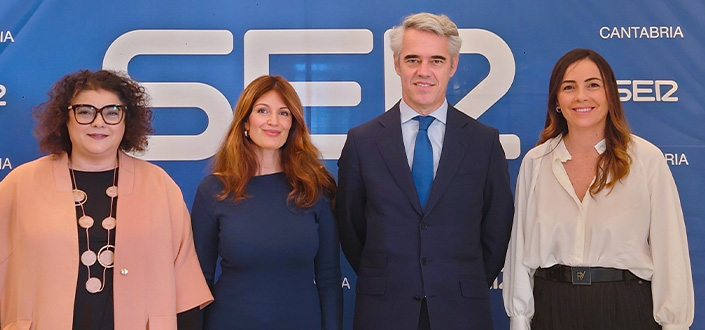The European University of the Atlantic (UNEATLANTICO) continues to strengthen its links with leading professionals in the communication sector. Mónica Revilla, regional director of Cadena SER Cantabria and delegate of Prisa Media in the region, will give internships in the subject Radio Routines, aimed at students of the degrees in Audiovisual Communication (CA), Journalism (PER) and Advertising and Public Relations (PRP). This initiative will allow students to gain practical experience directly from a recognised professional in the field.
At the same time, the university also played a prominent role in the forum organised by Cadena SER, where the vice-rector for academic planning and teaching staff, Dr. Silvia Aparicio, participated in a meeting with Mónica Revilla, Ignacio Soto, general director of Cadena SER and Olga Agüero, dean of the College of Journalists of Cantabria and professor at UNEATLANTICO. During this forum, Soto gave a talk entitled ‘Radio, 100 years of evolution’, in which he reflected on the trajectory and future of the radio medium in a context marked by technological transformation.
Ignacio Soto stressed that ‘radio accompanies you from the moment you get up until you go to bed; it remains a meeting place and a beacon’. He pointed out that radio, after a century of existence, is still in constant evolution, with 25% of its audience already listening to it from digital devices. This technological transition, far from being a threat, has allowed radio to retain its essence thanks to ‘technological neutrality’, offering the same content regardless of the medium from which it is accessed.
Regarding the impact of new technologies, Soto reflected on the irruption of generative artificial intelligence in the media. He said that this tool will not replace journalists, but will function as an aid to optimise searches and processes in newsrooms. ‘It will be a tool to enhance the work, but never a replacement,’ he said.
In addition, the CEO highlighted how podcasts have boosted the consumption of radio content in Spain, where more than 80% of podcasts listened to come from the radio. However, he warned about the current challenges related to the proliferation of fake news, which is affecting trust in the media and putting democracies at risk. In this context, Soto stressed that ‘media credibility and trust become very precious and fundamental assets’.
With the incorporation of Mónica Revilla to the practical teaching at UNEATLANTICO and the active participation of the university in relevant events of the sector, the commitment to train future communication professionals connected to the trends and challenges of the real world is reinforced.


